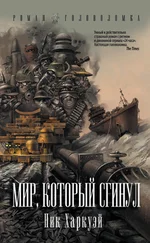The Sergeant drank his first pot dry very quickly and ordered another, and some bread and butter. These also turned out to be excellent – the butter was a pale vanilla froth which spread onto the sourdough and lifted it to something like the level of the tea.
By the time he had finished the bread, the rain was worse, battering on the corrugated-iron roof; rain in the tropical style, by the gallon, with the force of a fist. It was loud, but not unpleasant because Shola had padded the interior of the roof with bags of sheep’s wool. The noise was muffled rather than entirely blocked, but the wool meant sitting in the place during a storm was like listening to a troop of mounted horse on the road rather than being inside a giant metal drum. More customers were coming in, cursing and laughing, water streaming from their faces and sloshing from their shoes.
The Sergeant smiled an occasional greeting when someone made eye contact with him, drank his tea, and listened. Like the boy, he had a mobile telephone, a bulky, simple thing with large buttons and a big battery which went on for days. It was next to his tea. At some point – he wasn’t sure when, the action was automatic – he had inserted the battery and switched the device on. He had to do this because except in emergencies he did not travel in-country with a live phone. It was a residual proscription, pointless here, where anyone who was looking for him could just come to the house, but it went against the grain to reveal his location while he was on the move. He restricted the phone’s sign-ins to those places he was known to go and otherwise kept it inert, so that an enemy seeking him in transit must identify him by sight and in person, and risk a comparable exposure.
He took another sip of tea and idly, with his left hand, traced the outline of a deep gouge in the tabletop. It had probably been made with the sight of a handgun. An idiotic thing to do, a lousy use for a gun and bad practice for a soldier, but of course any number of people who had sat in this place with handguns had probably not been soldiers, and many of them – soldiers or not – had undoubtedly been idiots. You couldn’t look at Mancreu and imagine that the island hadn’t seen more than its fair share.
The rain stopped, and a few minutes later the Sergeant came to the end of his tea and of his introspection, and at the same time the boy apparently concluded that he had read and reread his comic book as much as he wanted to. The Sergeant reached for his phone to remove the battery, and was aware of an immediate sharpening of interest and a searchlight intensity in the air.
He kept his hands very much on the table, and softened his shoulders. He didn’t want anyone to make any mistakes about how relaxed he was, how calm, and how he did not intend to reach for his side arm. He wondered who had come in, and how they had done it without making any noise, without the light from the door falling across him. Perhaps they had come from inside the bar, from the private rooms.
He looked up and found the boy watching him, eyes shadowed, body almost entirely wrapped in the dark of his corner table. The bodyguard’s table, the Sergeant called it in his mind, a table he would not have chosen to sit at because he didn’t want to be known as a man who kept his eye on the door. It was enough that he was a soldier. He didn’t want the people of Beauville to think of him reckoning each drinker, making sure he could kill them if he had to. Though of course some part of him did all those things, in the back of his mind, registered newcomers and regulars, weighed them and categorised them, so that if it ever came to it – whatever ‘it’ was – he would know whether to stand or flee, how many could he take down, what would it cost him, and how bad would it get.
Very bad, was the answer, always. One way or another: very bad.
The Sergeant kept his eyes on the boy – not aggressive, just interested – and the boy looked back at him in exactly the same way, reassessing, cataloguing, considering. Why? Where did this stark, sudden appraisal come from? The boy was part of the landscape, a customer. The Sergeant had a vague notion he had glimpsed him before: getting out of a coracle on the waterfront; running errands and bringing messages; sitting and reading. Why was he allowing himself to be visible, exposing himself by this close, intrusive scrutiny? The Sergeant had pegged him as smart and jittery and possibly traumatised. So. What now?
The boy’s body was very still, a mirror of his own demonstrative calm, and the Sergeant, changing the focus of his attention without changing the position of his eyes, followed the line of one scrawny shoulder down to the hands. Then after a moment he snorted approvingly. He relaxed, and felt as much as saw the boy doing the same. For all their physical differences, in this moment they were identical: backs straight, heads slightly forward as they prepared to push themselves to their feet. And each of them was holding his phone’s battery in preparation for putting it away, in a separate pocket. A twin paranoia. A wise man does not catalogue his road home.
The boy nodded to him. The Sergeant nodded back.
‘You are smart,’ the boy said.
‘You too.’
The boy nodded.
‘You like comics?’ the Sergeant asked, then heard the echo of the question and saw his own child self shaking his head at the stupidest thing ever said by man.
But the boy was gracious, respecting the gambit for what it was. ‘Yes.’
‘Which ones?’
‘All. Some DC, for Batman. Grant Morrison! But mostly Marvel. Warren Ellis. Also Spurrier, and Gail Simone. Bendis is full of win.’
The Sergeant grinned. He had never heard this expression before, but he approved of it. Full of win. It had a digital flavour, merry and modern. More things should be full of win.
‘I like Green Lantern,’ he said.
‘Which one?’ the boy demanded.
Oh, sod it. Now he remembered: there were so many Lanterns to choose from, and always changing, and the wrong one was like the wrong football team, the wrong church… ‘Hal Jordan,’ he said, dredging up the name.
‘That is totally Old School,’ the boy approved. ‘Jordan is bad ass.’ He separated the words: bad ass . The Sergeant suspected he had learned them by reading. He wondered which comics allowed that sort of language, and realised: probably all of them, these days.
‘You like Captain America, too?’ the boy asked.
The Sergeant hesitated. ‘Not so much,’ he admitted. Bright colours and battlefields didn’t mix for him. Steve Rogers was an invincible man, an overman who wore what he damn well liked, and survived. It was the men around him who didn’t make it. No. The Sergeant did not like Captain America. Perhaps he had once, when he was younger.
The boy nodded as if this was to be expected. ‘Batman?’
‘Yes.’
‘Batman is best. Bob Kane was a god. Also Bill Finger.’ The Sergeant had only the dimmest idea who these people were.
The boy seemed to realise that the conversation had become too technical, because he proffered the comic he had been reading. ‘Here,’ he said. ‘Christian Walker is full of win.’
The Sergeant took it, then hesitated. ‘How will I get it back to you?’
‘I’m around,’ the boy said vaguely. ‘But there is n.p. – I do not collect them.’ The boy stopped, grinned. ‘That is not true! I do collect them. But to read, not like a crazy shut-in dude!’
‘I’ll get it back to you,’ the Sergeant promised.
‘ Kswah swah ,’ the boy replied with a shrug. What happens, happens . Very Mancreu. On the Arabian mainland they said insh’Allah – if God wills it. If God willed it, you might arrive punctually for your appointments, but generally He willed that you show up more or less on the same day. Time and matter were flexible; only God was real. On Mancreu, even God had somehow faded away. The universe was what it was, mutable and strange, and God had made it in His image, so He too was probably imponderable. The nature of His will varied from soul to soul, and what actually happened often wasn’t what anyone understood by it. Perhaps God, being everywhere and seeing all things from outside time, was incapable of willing anything which men could grasp as a plan.
Читать дальше








![Ник Харкуэй - Гномон [litres]](/books/400023/nik-harkuej-gnomon-litres-thumb.webp)



